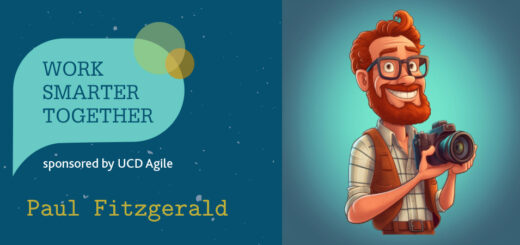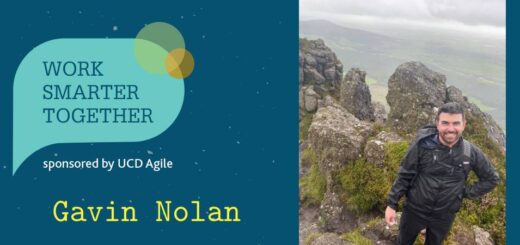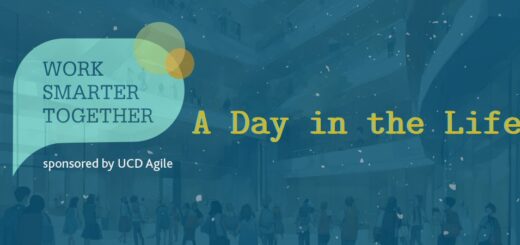Emily Smith – A Day in The Life
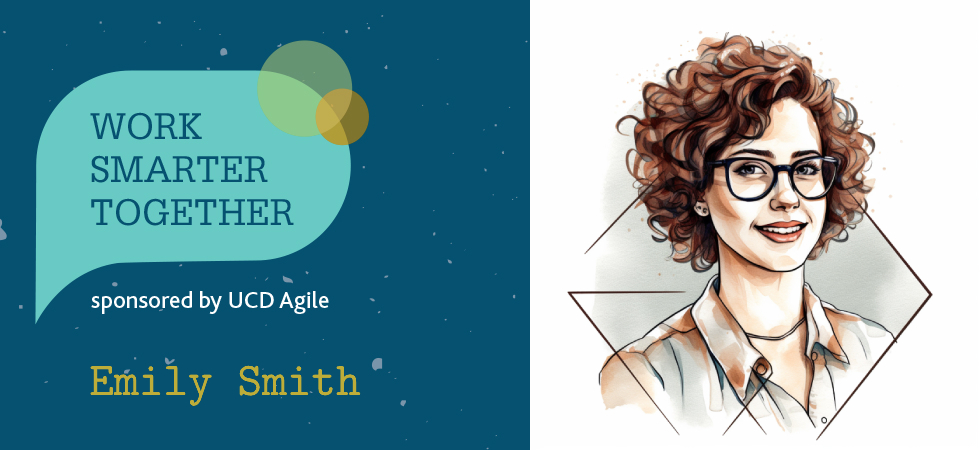 Who are you?
Who are you?
I am Emily Smith. I am the Assistive Technology Coordinator in UCD Access & Lifelong Learning.
How did you get here? What was the journey to UCD?
I have always been interested in how people learn and communicate. I moved to Dublin for my undergraduate degree and studied French and English Literature at Trinity College Dublin. During this time, I was lucky enough to work in Marsh’s Library, Ireland’s first public library, and I became really interested in the politics around literature and publishing – who has access to what information and why. How do we democratise access to knowledge?
Following my graduation, I worked as an English tutor in a high school in Quebec, where I did learning support for students with disabilities and students in foster care. I then returned to Ireland to take up a scholarship as a Postgraduate Researcher in Irish Literature. While studying, I worked as a graduate tutor in French literature, and I also worked in student support in TU Dublin. Although I had wonderful experiences presenting my research at conferences in Ireland, France and Canada, I realised that my real passion was working with students. On the day I submitted my Masters thesis, I received a call inviting me to interview for the UCD Access & Lifelong Learning Operations team, and I haven’t looked back! Over the last 4 years, I have worked in a range of roles supporting students from under-represented backgrounds, I have completed my Masters in Education focusing on educational technologies, and I am happy to have found my passion in Assistive Technology and promoting digital inclusion around the University.
What is your role within UCD, and what are your main responsibilities?
A significant part of my role is supporting students with disabilities to participate in their studies. This begins with a needs assessment to discuss classroom and exam supports. I work primarily with students with physical and sensory disabilities as they are more likely to require very specific Assistive Technologies and training, for example, screen-reading technology, digital magnifiers or hearing devices. However, Assistive Technology can be anything from a recording app, to an iPad. Any student with a disability can be referred for AT, and my job is to collaborate with them to find technologies that suit their individual needs, learning preferences and course requirements. It is very much a student-centred process.
On a broader scale, I support UCD’s University for All initiative which aims to create a campus environment where inclusion is a shared responsibility and value. As part of this, I collaborate with colleagues around the university to develop accessible online learning materials and practices which are suitable for all students, to widen access to assistive technologies for all, and to ensure that our digital campus, for example, our websites and registration processes, are as inclusive as our physical environment.
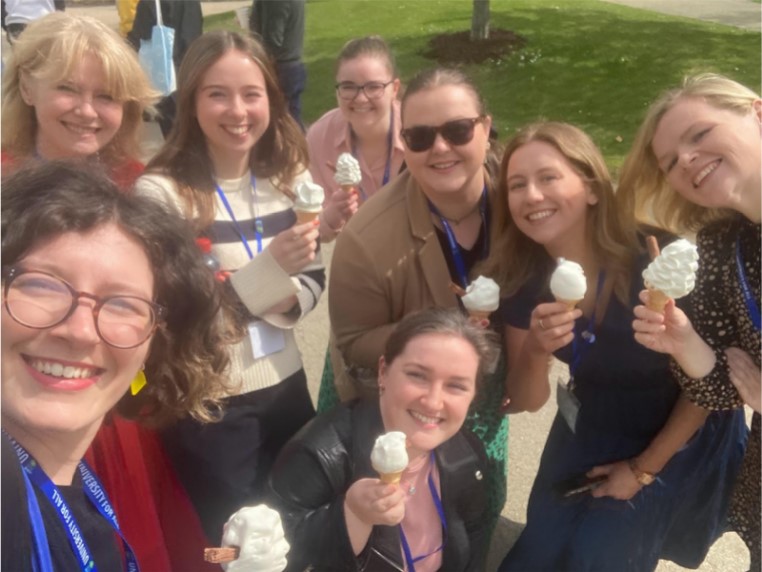
Enjoying ice-creams at our University for All Symposium (Left to Right – Emily Smith, Michelle Tracey, Lucy Kelly Crimmins, Kim Lombard, Ailbhe King, Marlene Douglas, Ciara McHale and Lisa Padden.)
Could you briefly describe what a typical day looks like for you?
As anyone who works in student support will tell you – every day is different. The only constant is that I begin the day by getting a morning coffee with my colleagues! Generally, my calendar is made up of student appointments – this could be needs assessments, support meetings, or AT training. We have a daily drop-in from 11-12 during the teaching term where students can avail of support without an appointment. It’s really important to me that I am always available during this period.
Beyond my student-facing work, I am lucky enough to work on a diverse range of projects both within UCD and in the wider Access sector developing inclusive digital teaching practices. This includes workshops for faculty on developing accessible materials for Brightspace and introducing new technologies to the college community.
What are some of the most interesting or challenging tasks you encounter on a regular basis? Why are they unavoidable?
The interesting thing about working with AT is that you are always having to find new ways of doing things – so, how do we ensure that students with physical disabilities can fully participate in labs, or that a student with a visual impairment can use a course-specific software. My job exists because we design things with an ‘average’ user in mind. The fact of the matter is that there is no average UCD student, and assuming otherwise is what creates barriers to participation. On a daily basis, I work to find individual AT solutions for students – so things like software or custom devices, but the long-term goal is always to create a learning environment that anticipates diversity from the off-set.
Are there any specific projects or initiatives you or your unit are currently working on that you would like to share?
I’m really excited about our work promoting compliance with the EU Web Accessibility Directive as part of the University for All initiative, and it’s one of those things that we can all start engaging with straight away. Small changes such as ensuring images have alternative text, videos are captioned, or that documents have correctly inserted headings mean that everyone in our campus community can engage with our digital material, regardless of the device they are using or if they require assistive technologies. To support these new habits we have introduced the Ally checker in Brightspace which gives feedback on the accessibility of learning materials, and for Terminal 4, Silktide has been installed to provide feedback on web content. Pretty much all of our communication in UCD, whether that be lecture materials, recruitment, or just contacting colleagues is digital, and it’s so important that it is formatted in an inclusive way that ensures everyone can get the information that they need.
Is there a process or element of your work that you would improve or change?
I would love to have more time to grow an Assistive Technology community in the university, giving more visibility to the Assistive Technologies we have available to all members of the university, students and staff alike. There can be a misconception that AT is highly specialist and only for people with disabilities, or those with very specific needs, but in actual fact, a lot of it is about recognising that we all have different ways of approaching work and learning. Widening access and use of AT is part of building an inclusive mindset where difference is celebrated. One example of this is SensusAccess, which is a tool that allows anyone with a UCD email address to change documents into a format that works best for them – so PDFs to MP3 files to listen to on the go, or documents to ePub files to read on Kindle. It’s also really handy if someone sends you a PDF and you need to edit it as a Word document but don’t have Adobe!
Could you share a memorable experience you’ve had while working in your role?
The day after we launched Ally in Brightspace for students, I got an email from one of our students who has a visual impairment describing how the option to just download their readings from Brightspace as an MP3 was a ‘game-changer.’ Although offering these tools seems like a small thing, that integration removed so much extra work for the student around bespoke technologies and also sign-posted that as a university we are equipped to support all of our learners.
Is there a particular skill or expertise that helps you in your role and what advice would you give to someone joining your unit?
The main thing is probably flexibility – we work with students from a variety of backgrounds and we also collaborate with colleagues coming from different spheres within the third level sector and even different professional cultures within the university. Building a University for All is a collective endeavour and in the process of building a community that values diversity, we also have to anticipate, facilitate and celebrate it in our everyday interactions.
How do you collaborate with other teams or colleagues in your day-to-day work?
A big part of my job is working with faculty and programme offices to support students with disabilities. This could be anything from working together to ensure the content of a reading list is accessible to a student who uses reading technology, or looking at how we can make a field trip more accessible for a student with a physical disability. Our team also works very closely with UCD Assessment to set up the alternative exam centre and implement reasonable accommodations for students with disabilities in the end-of-trimester exams – this is a huge piece of work and the preparation starts well before the exam timetables are announced!
Within our own unit, we are in constant communication to support students. We are an interdisciplinary team and place a huge emphasis on a student being able to walk into the centre and get directed to the help they need. It might be that I meet a mature student for a needs assessment and they disclose that they’re unsure about their course choice – the next step is for me to introduce them to my colleague, the mature student adviser. UCD is a massive eco-system and it is really easy to feel overwhelmed or a bit lost around who does what! We aim to be a one-stop shop and to get students to where they need to be.
Are there any common misconceptions about your role?
I think people think I’m a massive technology nerd! Although I love learning about new technologies, the thing that drives me is seeing students able to take ownership of their learning and to fully participate in campus life. It might be that a really simple pen grip helps them to do that, or it could take weeks of training on voice control software, either way, the buzz comes from seeing that independence.
How do you see your job changing over the next ten or twenty years?
That’s a massive question when talking about technology! I think we’re going to see more AT being integrated into everyday technologies and more people using AT. We’re already seeing it with Microsoft Office, and with Apple devices. I think we’re also probably going to see more AI being used to support AT. It’s already really common for typing technologies and literacy supports, but there’s huge potential for things like navigation tools for folk with visual impairments, so things like audio-description of landmarks and the ability to identify and read out signage.
What is an achievement big or small you’ve had while in this role?
Honestly, seeing colleagues from all over the university attend our Global Accessibility Awareness Day sessions and participate in the Ally Fix Your Content Day challenge was really special. It was my first big event in this role and it was wonderful to see people from different units coming together and exploring digital accessibility in their own context.
If your job had a theme song or soundtrack, what would it be [and why]?
Anything by Lizzo! We’re big Lizzo fans in our office – I think 5 of us actually ended up being at her concert at the 3 Arena! She is so comfortable in her own skin and owning exactly who she is, and that’s what we want for all of our students. A common piece of feedback we get in our surveys is students feeling like an ‘imposter’ or like they don’t belong in UCD, and that needs to change. We want a university where everyone feels welcome, valued, and ready to achieve whatever they want.

